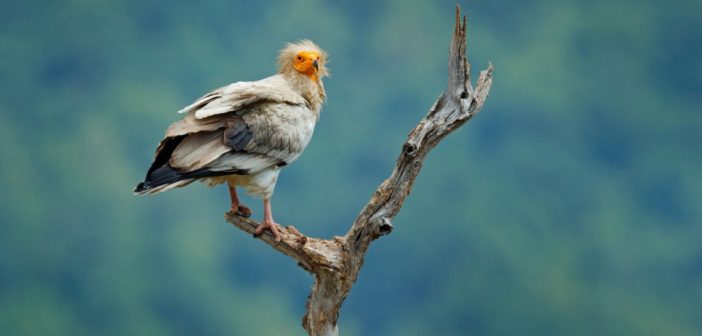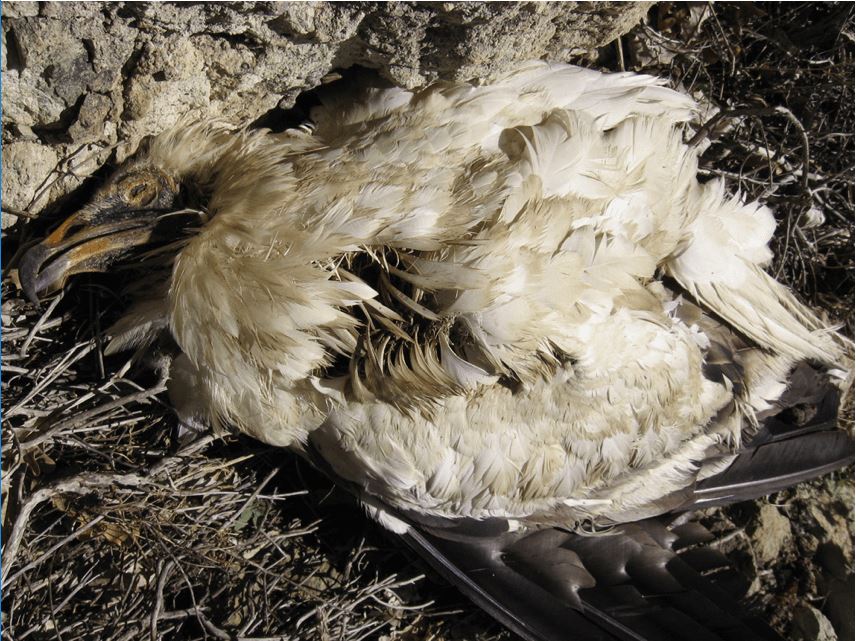Faced with a challenge as tough as an ostrich egg, lesser scavengers may give up. Not Egyptian vultures. One of evolution’s great problem-solvers, these ingenious raptors will set off in search of a suitably sharp pebble. Once they have found one of the right dimensions, they will swing their necks down and fling it upon the egg. If it doesn’t work the first time, they will try again. They almost always get their dinner.
It’s not just pebbles. The Egyptian vulture (Neophron percnopterus) also uses twigs to roll up wisps of wool and take them back to line their nests. Such behavior was first recorded by astonished Victorian naturalists visiting the African continent – but the people of Africa had known the birds were special for a long time. In ancient Egypt, the species was sacred to the goddess Isis and hailed as a symbol of royalty, protected by law. The species was so iconic and widespread that it was nicknamed the “Pharaoh’s chicken” and even used as a hieroglyph.
If only modern humanity had the same respect for this species. Today, it is facing challenges that even the great problem-solver of the bird world can’t overcome. On the 5,000 kilometer [about 3,100 mile]migration between their European breeding grounds and sub-Saharan wintering grounds, these birds risks being poisoned by lethal farming chemicals, electrocuted by powerlines, or shot down by poachers and stuffed as macabre trophies.
The devastation has been wholesale. The European population has plummeted by 50% in the past 40 years, and worldwide, only one in seven juveniles reaches adulthood. For a long-lived species whose lifespan can stretch to 30 years, every bird killed has a profound impact on future numbers.
Illegal killing is a particular problem in the Balkans. Birds who escape poisoning or electrocution may instead be shot down and sold as trophies on the Western European black market. The population has plummeted by more than 80% in the past 30 years, and now only 70 pairs remain. But a more unusual threat is also at play. Eggs and chicks are often stolen straight from the nest and sold to egg collectors, or raised in captivity to be kept in zoos or private aviaries.
In response, our partner, the Bulgarian Society for the Protection of Birds (BSPB) are doing everything in their power to safeguard the Egyptian vultures who pass through their country. They have set up nest-guarding schemes to protect breeding grounds from human disturbance. They have satellite-tagged Egyptian vultures to track their movements and better understand where and how to protect them. And they run a much-needed captive-release program to bolster wild populations, aided by breeding centers across Europe.
They’re also leading something that, like the vulture, goes beyond national borders. With the help of 13 other countries besides Bulgaria along the vulture’s migration route, together with BirdLife Partners*, BSPB is spearheading an ambitious new project, “Egyptian Vulture – new LIFE.” One of the main aims of this initiative is to set up a string of “vulture safe zones.” These are areas cleared of poisoning hazards and supplied with suitable, safe food.
Poisoning is a serious threat to vultures worldwide, and comes from multiple sources. Farmers may leave out poisoned bait to eliminate livestock predators such as lions and wolves, with vultures becoming the unintended victims. Less directly but no less devastatingly, many vultures are killed by the veterinary drug diclofenac, which is used as a painkiller on farmed animals, but is deadly to the vultures that scavenge upon deceased livestock. Although diclofenac has been outlawed across Asia, it has, in a shocking step backwards, recently been approved for veterinary use in Europe. BSPB is part of the campaign to reverse this decision.
Egyptian Vultures put a huge amount of effort into breeding and raising their young. Couples perform magnificent aerial courtship displays and work together to care for their brood. After all this effort, having their young stolen from the nest or poisoned before they have the chance to reproduce themselves is unthinkable. It’s true that Egyptian vultures occasionally feed on ostrich eggs, but only ones that are infertile or have been abandoned by their parents. We will not accept a one in seven survival rate – we won’t rest until all juveniles have the chance to live a long and natural life.
* The Egyptian Vulture: New Life project is supported byBirdLife Partners Doga Dernegi (BirdLife in Turkey), Hellenic Ornithological Society (BirdLife in Greece), RSPB (BirdLife in the UK), BirdLife Africa and BirdLife Middle East.
Featured image: the Egyptian vulture was once nicknamed the “Pharaoh’s chicken.” Image credit BirdLife Europe.






